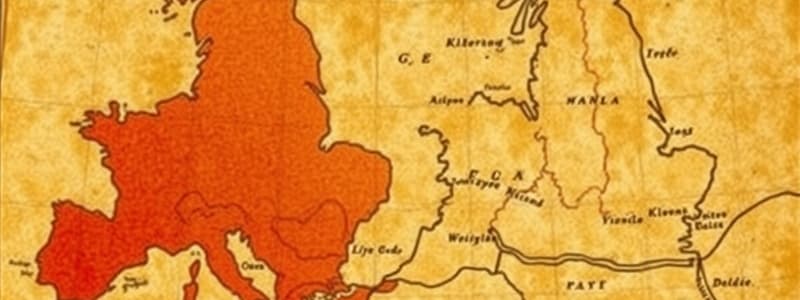Podcast
Questions and Answers
Which was a significant reason for England's rejection of political incorporation with Scotland in the early 17th century?
Which was a significant reason for England's rejection of political incorporation with Scotland in the early 17th century?
- The English parliament was unwilling to have a parliament under Scottish control.
- Scotland's cultural distinctiveness was too great. (correct)
- Scotland was economically independent from England.
- Irish support for Scottish integration was lacking.
What was the nature of England's relationship with Ireland by the 17th century?
What was the nature of England's relationship with Ireland by the 17th century?
- Ireland was a dependant kingdom with limited integration. (correct)
- Irish support for Protestantism was strong.
- Ireland enjoyed an independent governance system.
- Ireland was fully incorporated into the English kingdom.
What factor contributed to the consolidation of England as a global power under William of Orange?
What factor contributed to the consolidation of England as a global power under William of Orange?
- Expansion of land ownership.
- Increase in agricultural output.
- Establishment of a new trading alliance.
- Massive build-up of the army and navy. (correct)
Which event is most closely associated with the formal union of Scotland and England?
Which event is most closely associated with the formal union of Scotland and England?
What was one impact of the Protestant Reformation on England's relationship with Ireland?
What was one impact of the Protestant Reformation on England's relationship with Ireland?
What was one of the primary reasons for England's increasing desire to control Scotland after Queen Anne's accession?
What was one of the primary reasons for England's increasing desire to control Scotland after Queen Anne's accession?
How did the demographics of England influence government policy during the War of the Spanish Succession?
How did the demographics of England influence government policy during the War of the Spanish Succession?
What was the status of Scotland's trade balance in the years leading up to the Act of Union?
What was the status of Scotland's trade balance in the years leading up to the Act of Union?
What misconception exists regarding the motivations behind the Treaty of Union in 1707?
What misconception exists regarding the motivations behind the Treaty of Union in 1707?
What was a significant political consequence of the Treaty of Union regarding Scottish representation?
What was a significant political consequence of the Treaty of Union regarding Scottish representation?
Flashcards are hidden until you start studying
Study Notes
Formation of Early Modern States
- Early modern states often formed through conquest or absorption; England absorbed Wales and Cornwall in 1543 through parliamentary action and integration.
- Ireland was declared a dependent kingdom in 1541 but not fully incorporated; Tudor monarchs struggled with conquest and faced cultural distinctiveness challenges.
- Migration to Irish plantations during the 17th century aimed to reduce the Catholic majority, spurred by English efforts under James I to create a British identity.
Opposition to Union
- The transition from regal union (1603) to parliamentary union (1707, 1800) encountered significant resistance.
- The English Parliament rejected proposals for political incorporation with Scotland in multiple instances (1607, 1670, 1703, 1707, 1709).
- Attempts at union discussions in the House of Lords (1695) and House of Commons (1700) failed to gain traction.
Scotland's Role in the Union
- England’s global power expansion under William of Orange relied on a strong military supported through increased national debt and trade taxes.
- Scottish commercial networks posed a disruption to English trade, exacerbating tensions between Scotland and England.
- Queen Anne's reign heightened England's desire for control over Scotland, particularly against the backdrop of potential Jacobite support from France during the War of the Spanish Succession.
Act of Union 1707
- The Treaty of Union was positioned as a union to aid an impoverished Scotland but reflected mutual interests and not sheer altruism.
- The Scottish economy suffered from a poor balance of trade; however, government financial distress did not equate to national impoverishment.
- Scottish negotiators’ perceived ineptitude in negotiations focused on colonial access, reparations from the Darien venture, and manufacturing investment, resulting in minimal concessions.
- The arrangement restricted Scottish representation in the British Parliament: only 16 peers in the House of Lords and 45 MPs in the Commons, less than Cornwall's representation.
- The English Parliament effectively became the British Parliament, with some adjustments for Scottish interests but significant limitations on Scottish political power.
Studying That Suits You
Use AI to generate personalized quizzes and flashcards to suit your learning preferences.




